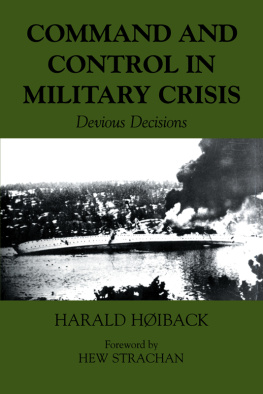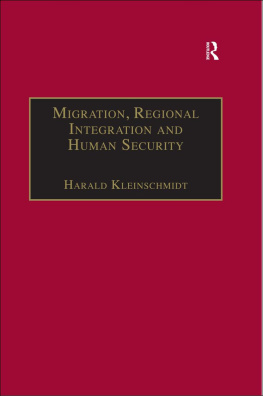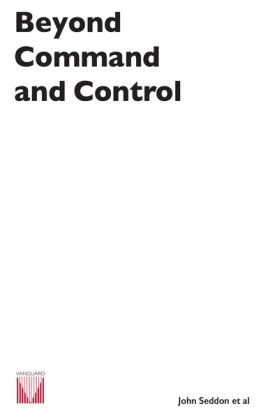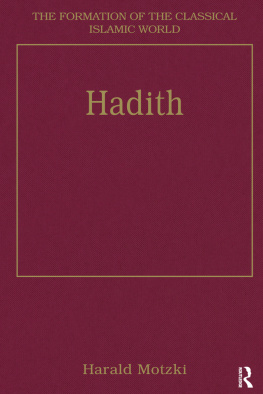COMMAND AND CONTROL IN MILITARY CRISIS
CASS SERIES: MILITARY HISTORY AND POLICY
Series Editors: John Gooch and Brian Holden Reid
ISSN: 1465-8488
This series will publish studies on historical and contemporary aspects of land power, spanning the period from the eighteenth century to the present day, and will include national, international and comparative studies. From time to time, the series will publish edited collections of essays and classics.
1. Allenby and British Strategy in the Middle East, 19171919
Matthew Hughes
2. Alfred von Schlieffens Military Writings
Robert Foley (ed. and trans.)
3. The British Defence of Egypt 19351940: Conflict and Crisis in the Eastern Mediterranean
Stephen Morewood
4. The Japanese and British Commonwealth Armies at War, 19411945
Tim Moreman
5. Training, Tactics and Leadership in the Confederate Army of Tennessee: Seeds of Failure
Andrew Haughton
6. Military Training in the British Army, 19401944: From Dunkirk to D-Day
Tim Harrison Place
7. The Boer War: Direction, Experience and Image
John Gooch (ed.)
8. Caporetto 1917: Victory or Defeat?
Mario Morselli
9. Postwar Counterinsurgency and the SAS, 19451952: A Special Type of Warfare
Tim Jones
10. The British General Staff: Reform and Innovation, c.18901939
David French and Brian Holden Reid (eds)
11. Writing the Great War: Sir James Edmonds and the Official Histories, 19151948
Andrew Green
12. Command and Control in Military Crisis: Devious Decisions
Harald Hiback
COMMAND and CONTROL in MILITARY CRISIS
Devious Decisions
HARALD HIBACK
Norwegian Ministry of Defence
Foreword by
HEW STRACHAN
First published in 2003 in Great Britain by
FRANK CASS PUBLISHERS
2 Park Square, Milton Park,
Abingdon, Oxon, 0X 14 4RN
and in the United States of America by
FRANK CASS PUBLISHERS
270 Madison Ave,
New York NY 10016
Transferred to Digital Printing 2006
Website: www.frankcass.com
Copyright 2003 Harald Hiback
British Library Cataloguing in Publication Data Hiback, Harald
Command and control in military crisis: devious decisions.
(Cass series. Military history and policy; 12)
1. Command of troops 2. Command and control systems. 3. Command of troops Case studies. 4. Command and control systems Case studies
I. Title
355.33041
ISBN 0-7146-5490-6 (cloth)
ISBN 0-7146-8428-7 (pbk)
ISSN 1465-8488
Library of Congress Cataloging-in-Publication Data Hiback, Harald, 1969
Command and control in military crisis: devious decisions / Harald Hiback.
p. cm. - (Cass series - military history and policy, ISSN 1465-8488; 12) Includes bibliographical references and index.
ISBN 0-7146-5490-6 (cloth)
1. Command and control systems Case studies. 2. World War, 19141918 Campaigns Western Front. 3. Foch, Ferdinand, 185119129. 4. World War, 19391945 Campaigns Norway. 5. Military history, Modern 20th century Case studies. I. Title. II. Series.
U212.H65 2003
355.33041dc21
2003043887
All rights reserved. No part of this publication may be reproduced, stored in or introduced into a retrieval system, or transmitted, in any form or by any means, electronic, mechanical, photocopying, recording or otherwise, without the prior written permission of the publisher of this book.
Cover illustration: The sinking German heavy crusier Blucher.
To Kate and Ole-Magnus
List of Figures
Foreword
When a patient is seriously ill, his or her doctor will say that the illness is at a point of crisis. What the doctor means is that the illness could go either way the patients condition may ameliorate and the patient recover, or it may worsen and, at worst, the patient may die. These are the sorts of crises that we all encounter the moment of decision when the outcome is in the balance. Most such crises involve outcomes that are ultimately trivial a train missed or time lost. But the point of the use of the word crisis in such contexts is that a different choice could have resulted in the train being caught or time being saved.
This is not how theorists of international relations have used the word crisis. For them a crisis is more part of a process of escalation, and involves the interaction between two powers, not the decisions or behaviour of an individual. The Cuban missile crisis is a case in point. At issue was the cumulative effect of response and counter-response between the United States and the Soviet Union. If the medical use of the word crisis had any relevance here it concerned the product of that relationship: at one end of the spectrum of possibilities was peace and at the other war.
Harald Hibacks book is important and innovatory for two reasons. First, his understanding of crisis is that of the doctor, not that of the international relations theorist. Second, and consequently, crisis management occurs within wars as well as in their causes. Any reader of military history is familiar with the expression, the crisis of the battle had now been reached. Harald Hiback considers how command and control can affect crisis less in the tactical context of battle, and more at the political and military interface. It is a significant addition to our theoretical armoury not only for understanding the exercise of command in war but also and even for international relations theory.
Command and Control in Military Crisis works at another level too. Hiback illustrates his argument with two case studies. Each is a significant work of historical revisionism in its own right.
The first concerns Sir Douglas Haig and the vexed issue of the creation of an alliance command structure in the First World War. In March 1918, at the height of the first German spring offensive, Haig accepted, and, according to one version of his own account, even magnanimously suggested, the appointment of a French officer, Ferdinand Foch, as Allied generalissimo. The British treatments of this episode have for far too long uncritically accepted Haigs version of events, discounting the rather different perspective provided by the French. Hiback has achieved more than just the marriage of these two versions of the same affair. He has effectively exposed Haig by using his own words, through a careful comparison of the different versions of his diary.
The second example concerns a case closer to the traditional fields of international relations. On 9 April 1940, Germany invaded Norway. Norway was unusual among modern states in that its independence had not been achieved through the use of war: even the United States, which fought two wars, the War of Independence and the Civil War, to define itself, had stronger links between its national identity and its armed forces. The German invasion shattered the more optimistic readings of international relations that Norways earlier history had induced. But the military response to German aggression depended on the action of a single superannuated colonel. He saved the reputation not only of the Norwegian armed forces but also of Norway itself. This is the first full account of this episode in English.
Harald Hibacks book is short, but it is the work of an original mind, ready to challenge assumptions, to marry distinct disciplines, and to raise fresh questions.













